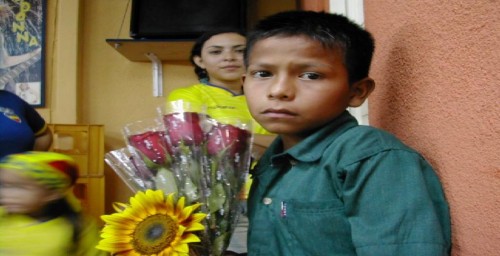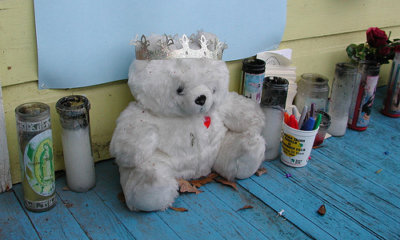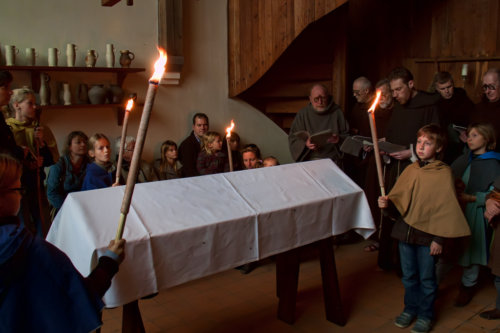Children and Grief – When a Sibling Is Lost

Dealing with the death of a child is something we all hope to never have to face. For those of us who must, it can be a battle between coping with our own devastating grief and the struggle to know how best to deal with our surviving children.
While it’s easy to just hope that children are resilient, and in some ways of course they are, siblings suffer as deeply from the loss of a loved one as their parents. Worse, if children aren’t helped to properly grieve, they are often left to carry their confusion and pain far into adulthood, with all the repercussions repressed sadness brings.
Children and grief is something that needs our attention. The more children can be helped deal with bereavement, the better.
To look at what it’s like for children to grieve a sibling, and how parents can best help, I’m going to draw from one of the most enlightening books about children and grief – Sibling Bereavement: Helping Children Cope with Loss, by psychologist Anne Farrant. Containing interviews with adults who have experienced the loss of a sibling in childhood and including the stories of Farrant’s own children, this is a remarkable and revealing book that gives voice to those who have struggled for years to come to terms with the loss of a sibling.
The challenges faced by a child grieving a sibling
At the moment of the loss of a child a family, which has its own special dynamic, is forever altered. A parent is inevitably lost to the overwhelming grief of losing a son or daughter. A child, on the other hand, will not just be experiencing the loss of their sibling, but also the loss of the family as it was, and often the loss of the way their parents were.

By: Bart Everson
Farrant’s book showed the following as the main challenges faced by children dealing with not just the death of a sibling but the grieving of the adults around them:
- Being denied a voice by not having a say in funeral arrangements or a choice of seeing their dead sibling
- Being confused by not finding out the practicalities or being lied to about what actually happened and how their brother or sister died
- Being forbidden to speak of their lost sibling
- Not being allowed to keep any possession of their sibling
- Feeling that they can never live up to the idealised image of their dead brother or sister
- Feeling the absence of parents who are emotionally withdrawn
- Thinking they are in some way to blame and even feeling guilty that they have survived
- Trying desperately to understand why all traces of their loved sibling are removed, or, a shrine is built around their memory
- Being made to feel alone, isolated and invisible.
Faced with such challenges and the resulting intense and complex emotions, and often with no outlet to express them, children find themselves struggling to make sense of things. If they are not given the support they need, this struggle can, as mentioned, continue long into adulthood.
How to help children who are grieving a sibling
Although Farrant is keen to not be prescriptive, as all families are different, she draws together certain themes which emerge from the people she interviewed as to what children need when faced with the loss of a sibling, both in the immediate aftermath and going forward.
1) Give the child information and knowledge which is appropriate for their age and understanding.
Children need their questions answered and need to understand what happened to their sibling. If they do not have this information then a child will fill in the void with their own imagination, often meaning the pictures they create are far worse than the actual real events.
2) Help the child feel included.
This does not mean that they are burdened with choices, or pressed to make decisions, but that they are asked how they feel and that they can have a say.
 For example, sometimes parents, in an attempt to protect their child, or shield them from their own emotions, keep a child away from a funeral. Parents do not always realise the long-term impact not attending this formal goodbye has on their child and how this impacts on them as a future adult. Many of the stories shared in Farrant’s book talk of the regrets siblings have over not being able to attend the funeral of their sibling.
For example, sometimes parents, in an attempt to protect their child, or shield them from their own emotions, keep a child away from a funeral. Parents do not always realise the long-term impact not attending this formal goodbye has on their child and how this impacts on them as a future adult. Many of the stories shared in Farrant’s book talk of the regrets siblings have over not being able to attend the funeral of their sibling.
3) Allow the child to talk about their brother or sister, should they wish to do so.
This is the most crucial of all for grief to follow its normal course. If a child is prevented from talking normally then the child’s grief will not be expressed, vocalised and heard. If this does not happen then the child can withdraw. Their grief will be pent up and may cause problems into adulthood.
4) Tell the child about the death of a brother or sister in a considerate way.
Imagine simply overhearing such devastating news as the death of loved one from people casually talking around you, or being told by someone you hardly know. The moment a child is told of their sibling’s death becomes a memory they never lose, just as it does for adults. Wherever possible, this moment needs to be shared with someone who is emotionally close to the child and able to support them.
5) Offer the child a realistic view of their deceased sibling.
When parents idealise the child who has died it sets a standard the sibling can’t live up to. They are left to chase approval, feel they need to be more special, gifted or clever than they are, or believe they have to prove they are worthy of survival. This is something which can deeply affect their feelings of self-worth and the choices they make throughout their life.
6) Allow the child to keep possessions belonging to their sibling.
It may be difficult for parents to understand, but children often want and need to have some of the things which belonged to their brother or sister.
7) Don’t download adult commentary on the child that is burdensome on him/her.
Comments such as ‘you are more precious now’, ‘you must be strong now and look after your Mum/Dad’ and ‘don’t make a fuss in public’ place a burden on a child which they should not have to carry. Such comments can also make a child pretend to be strong so as not to let anyone down.
8) Give the child emotional support.
Remember that children see everything, understand more than we realise, and are like emotional sponges. If parents are, understandably, unable to put aside their feelings and be emotionally available, they need to source help from other trusted adults and family members who can give much needed emotional support to their child.
Conclusion
The stories in Farrant’s book on children and grief reveals the devastating impact of not experiencing a normal grieving process. Many of the interviewees were left to since undergo grief counselling as an adult to help themselves. It shows that the way that adults handle loss, and how they behave around their surviving children, deeply affects these children’s future.
Although it is never too late to embark on bereavement counselling to come to terms with a loss which has been unresolved or denied, how much better if we all worked to understand children and grief and could give a child appropriate support at the time of their loss.
 Ruth Nina Welsh is a freelance writer specialising in lifestyle, wellbeing and self-help. She is also a former counsellor & coach and an erstwhile musician. Her site Be Your Own Counsellor & Coach offers visitors help and inspiration to live happier, more fulfilling, and purposeful lives.
Ruth Nina Welsh is a freelance writer specialising in lifestyle, wellbeing and self-help. She is also a former counsellor & coach and an erstwhile musician. Her site Be Your Own Counsellor & Coach offers visitors help and inspiration to live happier, more fulfilling, and purposeful lives.





When i was nearly four my one month old baby brother turned blue and died the specialist was sent for. He and others were around the pram i was pushed to the corner of the room. I was there when they laid him out, my mother put him in my dolls cot, probably waiting for the undertaker(it was 1958). I was told not to look in the cot. No one talked to me or asked me how i was. Later on my mom couldn’t stand to look at my cot so she gave it to the little girl over the road who was very happy with it. Now im 68 and im still processing it. I still believe wherever i am peoples lives are destroyed
Hi Mary, what a dreadfully traumatic experience for a child. We imagine your mother was in such a state of shock she didn’t think how this might effect you. What matters is not what anyone did or didn’t do then but what you do now. As believe it or not there are new treatments that can really help lower the emotional charge and unconscious beliefs these sorts of experiences can leave burned on our unconscious that leave us endlessly sabotaging our happiness. These are not really like talk therapy as they are more about changing how your brain holds on to a traumatic memory over talking about the past. And because it one clear trauma you are dealing with over ongoing trauma, these techniques work even more effectively. So you’d be a very good candidate. One is called EMDR, eye movement desensitisation and reprocessing. Another is called BWRT, brain working recursive therapy, https://harleytherapy.com/blog/posts/what-is-bwrt-therapy, that one is newer and growing in popularity in the UK, and you don’t even need to get into the details of the experience or talk about it really at all, it simply works to move your brain away from giving the memory any response, as does EMDR. These two techniques might seem very strange when you do them but they can really alleviate the anxiety around the memory so that in some cases when you try to recall them you feel nothing or even struggle to get to the memory, your brain loses interest! Which can be a tremendous relief especially after decades of guilt, anger, and suffering. Then there is clinical hypnotherapy which does similar. Once you do one of these therapies you will feel more stabilised, so if there were other childhood issues to deal with, or if the fallout from this experience meant things like growing up feeling unloved, a round of talk therapy would be more effective. And talk therapy for things like this can now even be done on the NHS, although you’d have to talk to your GP and you might get put on a waiting list at firs.We do hope you reach out for some support! Best, HT.